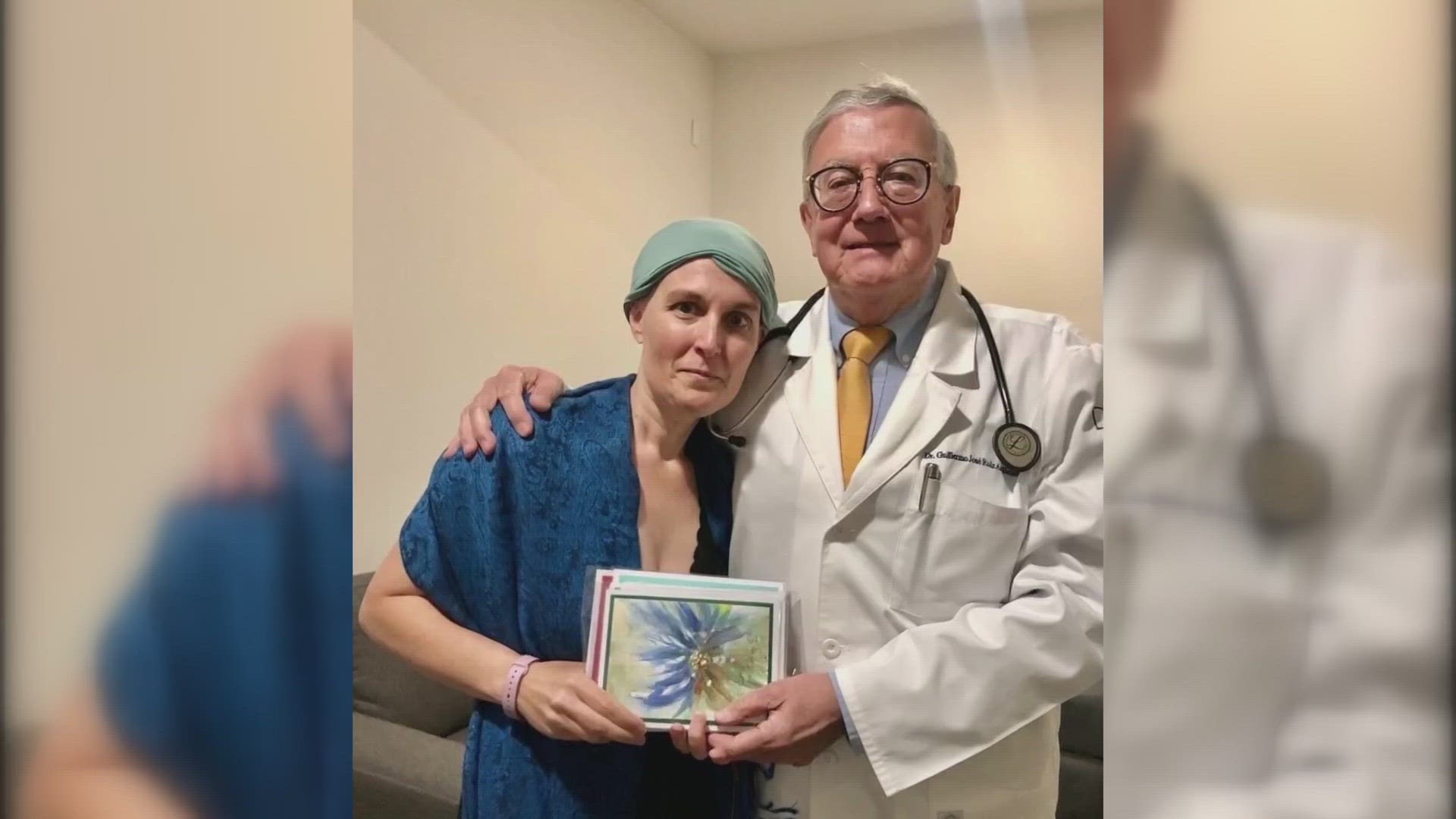BROWNFIELD, Maine — March is Multiple Sclerosis month, a time to raise awareness about a disease without a cure, affecting an estimated one million Americans.
The progressive nature of the illness has led more patients, including Mainers to head south of the border for a risky, experimental treatment, called HSCT.
Despite the risks and recent violence in Mexico, patients say the treatment offers the only real hope to potentially stop the disease in its tracks—a journey two Maine women had to take to get better.
When we first met Anna Mosca last summer, she was struggling to walk amid numbness, balance, and fatigue. Symptoms forced her to give up her successful dog grooming business. The mother of two has multiple sclerosis, which uses the immune system to attack the brain and central nervous system.
Now, Anna can walk up the stairs independently and take care of her family, something she hadn't been able to do for nearly a year.
"I don't have to nap anymore during the day or rest from the fatigue. It's like I am a whole new person," Anna said.
Anna has relapsing-remitting MS, a type of MS where symptoms get worse, followed by some improvements.
Late last year, Anna traveled to Puebla, Mexico for HSCT treatment. It is only available in the U.S. for patients in clinical trials, but Anna was not considered a candidate.
HSCT wipes out the patient's immune system with chemotherapy and reboots it with the patient's own stem cells so it stops attacking the central nervous system. During the treatment, Anna was tired and lost her hair, but started seeing improvements.
The 28-day treatment, which costs between $50,000 and $60,000, and is not covered by insurance, was administered at Clinica Ruiz. The clinic has two centers, which have treated more than 1,400 patients with MS and autoimmune disorders.
Nearly half of the patients are from the U.S.
It's run by Dr. Guillermo Ruiz-Arguelles, a hematologist who trained at the Mayo Clinic. He told NEWS CENTER Maine last August, out of five years of following patient outcomes, 80 percent of patients have a positive response to the treatment.
Clinica Ruiz is located more than 600 miles from the U.S. Mexico border where the recent kidnapping and killings of four Americans have raised questions about the safety of travel to the country. Anna said there was armed security personnel 24/7 at the clinic.
"I never saw or heard anything that made me feel unsafe," Anna added.
Seeing Anna's progress on social media inspired Amy Gaudet, to research the clinic.
"With the level of care they offer and their success rates, it was obvious that was the choice," Gaudet explained.
Amy has primary-progressive MS that can lead to damage in and around the nerves in the brain and spinal cord. Because of difficulties with balance, numbness, and pain, Amy has to use a walker just to get around.
Medication and treatment available here in the U.S. have provided only minimal relief to slow down symptoms. We spoke with Amy and her husband Rob, at their home in Milford, before they left for Mexico in early March.
"It could stop it dead in its tracks potentially. She could be better and we are looking for that little bit of hope," Amy's husband, Rob said.
Back in Brownfield, Anna is on antivirals and antibiotics to help rebuild her immune system. She hopes to reopen her grooming business in the next few months. It's living proof that taking your life back from MS is possible.
"This is something that works, you can reboot your immune system and this needs to be accessible to more people," Anna explained.
The Food and Drug Administration has issued warnings to Americans about seeking unapproved treatment overseas. Carly Kempler, a spokeswoman for the FDA told NEWS CENTER Maine in a statement:
"The FDA advises anyone considering a stem cell treatment and other products marketed as regenerative medicine products in another country to learn all that they can about the regulations covering the products in that country, including the reporting requirements associated with potential adverse advents.
"The FDA advises anyone considering a stem cell treatment and other products marketed as regenerative medicine products in another country to learn all that they can about the regulations covering products in that country, including the reporting requirements, associated with potential adverse events. These technologies, most of which are in the early stages of development, offer the potential to improve human health, but they can also pose risks for patients because of, for example, the way that they may be manipulated or administered.
"Some of the potential safety concerns include 1) administration site reactions, 2) adverse reactions due to the cell administration procedure, 3) potential unwanted inflammatory and or/immune response to the cells, 3) the ability of the cells to migrate from the site of the administration and differentiate into inappropriate cell types, 5) adverse effects on physiologic function, 6) risk associated with administrative procedures, especially when there is a lack of evidence to show that the cells function as anticipated in the target tissue of the body, 7) excessive pro filiation of the cells in the body, and 8) the development of tumors in the body. Unproven/unapproved stem cell therapies can be particularly unsafe and have led to serious infections, blindness, and death. Consumers should be cautious of any clinics, including regenerative medicine clinics, or health care providers, including physicians, chiropractors, or nurses, that advertise or offer any of these products," Kempler said.
For information from the FDA go here. The State Department has also issued travel advisories for people traveling to Mexico.

